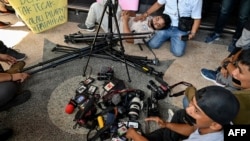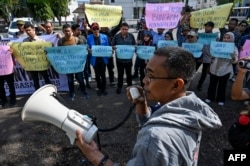Planned revisions to Indonesia’s broadcasting bill that include restrictions on investigative journalism are raising concerns among journalists and free expression analysts.
The draft bill seeks to revise Indonesia’s 2002 broadcasting law. Among the amendments are restrictions on the “exclusive broadcast of journalistic investigation,” the broadcasting of content that portrays LGBTQ “behavior,” and content on a profession or figure that shows “negative behaviors or lifestyles that could potentially be imitated by the public.”
Penalties for violations of the law could include written warnings or the revocation of licenses, according to the International Federation of Journalists.
Lawmakers say the revisions are needed to update a law that was first enacted more than 20 years ago. Critics say the proposal will restrict media and free expression.
"We see that the current draft of the bill is very far from our national interests, and it actually suppresses many rights of creativity, press freedom, and expression from citizens," said Yovantra Arief, of the Jakarta-based media monitoring group, Remotivi.
Arief, who is executive director of Remotivi, said that with the development of digital platforms, the revision of the law should capture the spirit of growth, instead of being a setback.
A 2021 survey by the data analysis group, the Katadata Insight Center, and the Ministry of Communication and Information showed that the majority of Indonesians — 73 percent — access information through social media, followed by television at 59.7 percent and the internet at 26.7 percent.
Ade Wahyudin, director of the Legal Aid Institute for the Press, questioned the reason for the proposed restrictions on investigative journalism, and noted that the Press Law already guarantees protection for journalists’ work, including the right to do news investigations.
"This vague article could potentially undermine journalistic work, not limited to investigation because its interpretation is still unclear," he told VOA. If passed, the bill would bring Indonesian media into the dark ages, he added.
Discussions to amend the broadcasting law have been taking place since 2020.
According to Reuters, the Indonesian Ministry of Communications and Informatics said the government has not received the draft bill.
Rizki Natakusumah, of the House of Representatives, acknowledged the concerns about the proposed law.
"The essence of this Broadcasting Law is to discuss what is appropriate, what is suitable (for broadcast), or the ethics in broadcasting itself,” Rizki said, adding that the government does not want to regulate press freedom.
Rizki said that lawmakers received input from law enforcement agencies who want to limit how the media report on some cases.
But investigative journalists say such carve-outs would restrict their ability to act as a watchdog for citizens and the public interest.
"The problem is, in some cases, from my personal experience, law enforcement agencies do not work properly," said Aqwam Fiazmi Hanifan, an investigative producer for the Narasi media outlet in Jakarta.
"Many investigative news reports in Indonesia ultimately manage to uncover a case that initially failed to be resolved by law enforcement agencies," he added.
He cited how Ferdy Sambo, the head of internal affairs for the national police, was convicted for his role in planning the 2023 murder of his bodyguard.
According to Aqwam, if media had not pushed to uncover the truth in that case, then justice may not have been secured for the family of the victim.
The proposed ban on LGBTQ content is also criticized by media advocates.
Homosexuality is still considered a taboo subject in Muslim-majority Indonesia, and it is illegal in Aceh province, which is under sharia, or Islamic law.
But Yovantra from Remotivi said audiences need to be able to access information on such issues.
Yovantra told VOA that all stakeholders should be involved in discussions on the bill and that its passage should not be rushed. "It's OK to discuss it again in the next period because this law will affect the lives of many people," he said.
This article originated in VOA’s Indonesian service. Fathiyah Wardah contributed to this report; some information is from Reuters.





